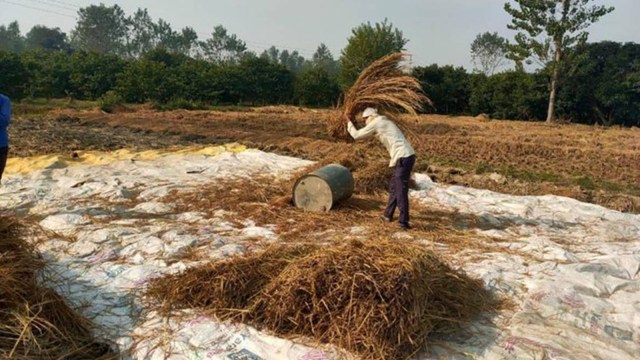Ministries flagged MSP concerns: Low returns to rising oil imports
Documents accessed by The Indian Express under the Right to Information Act 2005 show that several departments wrote to the Ministry of Agriculture and Farmers Welfare, flagging concerns.
 A new way of extracting vegetable oil (File/ Representational Photo)
A new way of extracting vegetable oil (File/ Representational Photo)A HIGH minimum support price (MSP) for some crops and not for others is hindering crop diversification and benefiting a select few states, various Union ministries have said in response to the proposal to fix MSP for rabi crops for marketing season 2024-25, an RTI filed by The Indian Express shows.
On October 18, 2023, the Cabinet approved the proposal to increase MSP of rabi crops such as wheat, barley, gram, lentil, rapeseed and mustard, and safflower, for marketing season 2024-25. The maximum increase over the previous year was 7.08% for lentil and 7.06% for wheat.
Documents accessed by The Indian Express under the Right to Information Act 2005 show that several departments wrote to the Ministry of Agriculture and Farmers Welfare, flagging concerns.
Concern 1: Import dependence
The Department of Food & Public Distribution said the MSP for oilseeds has not delivered the desired result in terms of an increase in domestic production, and India is still dependent on imports to fulfil 55% of its requirements.
Pointing to how a high rate of return of 102% (over cost of production) for wheat and 98% for rapeseed/ mustard attracts farmers to cultivate these crops, the department said, “Other crops (pulses and safflower), due to less return… discourage farmers to grow (them), thereby resulting in the country resorting to imports,” the department said in its September 14 letter.
“Even though an increase in production of oilseeds is estimated for 2022-23 (an increase in the domestic production of mustard by 5.31 lakh metric tonnes and safflower by 0.04 lakh metric tonnes) as compared to 2021-22, the country will still have to rely on imports to meet its requirement for edible oils,” it said.
Minimum Support Prices can influence farmers’ decision on choice of crops. Higher MSP, for example, for wheat has skewed procurement, and lower returns on seeds for edible oil, have necessitated imports. The Agriculture Ministry has said while it has a separate mission for crop diversification, it also has proposed a higher MSP for lentils.
The department said an increase in the MSP of oilseeds will incentivise farmers to increase its production and also shift to high yielding varieties.
The department said it may be helpful if a long term MSP policy, preferably for the next five years, is put in place so that farmers know what they will get in the future for their crops and accordingly take an informed decision.
Concern 2: Unequal benefits
The Department of Expenditure said that the skew in favour of wheat procurement means a limited number of states will benefit. “There is a need to address skewness in the coverage of states from which wheat is procured,” said the department in its letter dated September 25.
“The reason for the relatively high increase in MSP over previous years for wheat (7.06%) and lentil (7.08%) may be provided. MSP should promote crop diversification and incentivise production of oilseeds and pulses,” it noted.
The department said that non-price recommendations should be examined for implementation, including enhancing farm mechanisation, and added that the proposal may be routed through the appraisal/approval mechanism of the Expenditure Finance Committee.
The NITI Aayog, too, said that 14 non-price recommendations such as crop diversification, access to quality seeds and promoting efficient use of fertilisers may be complied with to increase the productivity of oilseeds and pulses. “The productivity levels of pulses in rice fallow areas are low in many states, which need to be addressed by the Department,” said the NITI Aayog in its letter dated September 11.
Concern 3: WTO obligations
The Department of Commerce, in its letter dated September 25, said the “de-minimis” subsidy limit has to be kept in mind, given India’s commitments to the World Trade Organisation. De-minimis refers to the minimal amounts of domestic support allowed even though they distort trade – up to 5% of the value of production for developed countries, and 10% for developing countries.
“India has breached the de-minimis subsidy limit for rice in 2018-19, 2019-20, 2020-21 and 2021-22 respectively and has invoked the protection under the ‘Peace Clause’. Some WTO members in recent years filed counter notifications claiming that India breached the commitment,” the department highlighted. The ‘peace clause’ allows exceeding the product-specific de-minimis by developing country members, subject to certain conditions.
“The procurement under the MSP should, therefore, not be open-ended, and predetermined targets should be specified simultaneously for procurement of crops for which MSPs are announced,” it noted.
The Agriculture Ministry response
While the proposal was eventually cleared by the Cabinet, the Agriculture Ministry, in its response to the suggestions, during an inter-ministerial consultation in September, said MSP recommendations are based on several factors, such as demand and supply, domestic and international prices, inter-crop price parity, terms of trade between agricultural and non-agricultural sectors, and the likely effect on the rest of economy.
“For rabi marketing season 2024-25, the all-India weighted average cost of production for wheat is expected to increase by 5.9% over the last year, therefore to compensate the farmers, an increase of Rs 150 per quintal is proposed. Further, to reduce import dependence and promote crop diversification towards oilseeds and pulses, higher increase in MSP is proposed in lentil,” the ministry said in response to the Department of Expenditure.
It further said the government encourages diversified production of crops such as pulses, coarse cereals, nutri cereals, cotton and oilseeds under the National Food Security Mission and horticulture crops under the Mission for Integrated Development of Horticulture.
On the question of crop diversification, the ministry also said they are implementing the Crop Diversification Programme, a sub-scheme under the Rashtriya Krishi Vikas Yojana, in the original Green Revolution States – Haryana, Punjab and Western Uttar Pradesh – since 2013-14 to divert the area of water intensive paddy crop to alternative crops like pulses, oilseeds, coarse cereals, nutri cereals, cotton, etc.
“As far as the WTO commitment is concerned, It may be noted that while calculating the aggregate support, ‘inflation’ since 1986 has not been factored in. This leads to an understated External Reference Price, making the aggregate support overstated,” said the ministry.








